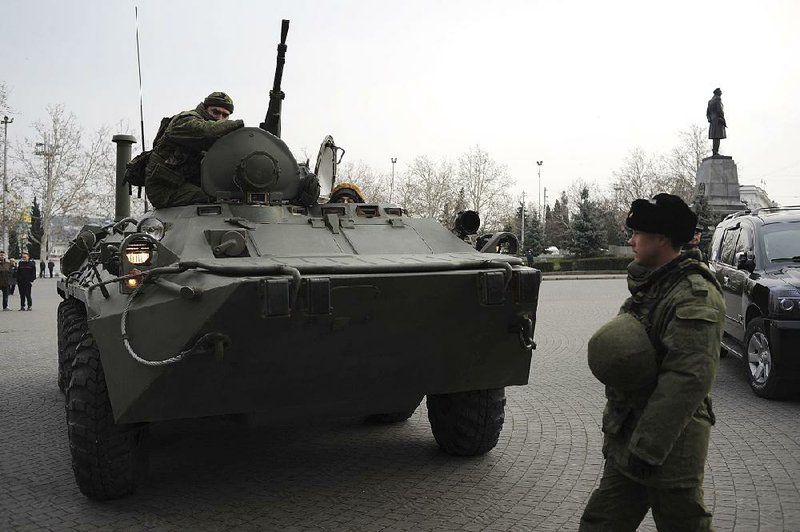KIEV, Ukraine - Struggling to reach a deal to form a new majority coalition in the parliament, and under pressure because of a looming economic disaster, the Ukrainian lawmakers temporarily running the country delayed until Thursday the naming of an acting prime minister and provisional government.
Tuesday’s delay underscored the difficulty lawmakers now face in rebuilding the collapsed government left behind when President Viktor Yanukovych fled Kiev on Saturday and was removed from power in a vote supported by some members of his own party.
The three main opposition parties, which share little in common politically, have been in fierce negotiations among themselves and with civic activists and other groups representing the many constituencies involved in Ukraine’s three-month civic uprising.
Arseniy Yatsenyuk, the leader in the parliament of the Fatherland Party and a leading contender to serve as acting prime minister, pleaded with colleagues to swiftly reach an agreement on the designation of an interim government, which is needed to formally request emergency economic assistance from the International Monetary Fund.
“The deadline is Thursday, and I urge all democratic parties and all democratic persons … urgently to finalize the deal on the coalition,” Yatsenyuk said. “We need urgently to hammer out this deal and to form the new government who is to be in charge of the country.”
“It’s not about the personalities,” Yatsenyuk added. “This is about the responsibility.”
A $15 billion bailout package secured by Yanukovych from Russia in December has been suspended, and Ukraine is now hurtling toward default. The value of the currency, the hryvnia, has fallen sharply, and the country effectively can no longer borrow on the international markets.
Foreign reserves have plummeted, and the Ukrainian government will soon be unable to pay public salaries or pensions. In a statement Monday, the acting finance minister said the country would need $35 billion in assistance between now and the end of next year.
Aid has been promised repeatedly by the IMF and the U.S., but it was unclear how quickly help would arrive. The IMF has made clear that it will demand austerity measures and other long-stalled economic changes in exchange for any assistance package.
As a manhunt continued for Yanukovych, who is wanted in Kiev on charges of mass murder, a Ukrainian news agency reported that his chief of staff, who was believed to be traveling with the fugitive former president, had been shot in the leg.
The news agency, Interfax-Ukraine, quoted a spokesman, Artyom Petrenko, as saying that the chief of staff, Andriy Klyuyev, had been wounded, but “as far as I know, there is no threat to his life.” Petrenko was quoted as saying that Klyuyev had resigned Sunday. Petrenko, a spokesman for Klyuyev, gave no details on the wounded man’s whereabouts.
In Kiev, the new speaker of the parliament, Oleksandr Turchinov, who is a veteran lawmaker and a former acting prime minister, has been designated to carry out the duties of president. On Tuesday, the parliament voted 316-0 to authorize Turchinov to sign legislation adopted by the parliament.
In other legislative developments Tuesday, the parliament voted 331-0 to schedule elections for Kiev mayor and the City Council on May 25, the same day as the presidential voting. The parliament also voted to give the International Criminal Court in The Hague jurisdiction to handle cases related to the deadly violence by the police against anti-government demonstrators last week.
Meanwhile, campaigning officially began Tuesday for the emergency presidential election.
Vitali Klitschko, the former champion boxer and a leader of one of the main parties in the parliament, the Ukrainian Democratic Alliance for Reform, declared his candidacy for president. Former Prime Minister Yulia Tymoshenko, who was released from prison Saturday, also is expected to run.
At a news conference in Kiev on Tuesday, Catherine Ashton, the European Union foreign-policy chief, urged the Ukrainian parliament to form a government that was inclusive and representative of all views, and called for peace and calm.
Ashton also said she had been in contact with Russian Foreign Minister Sergey Lavrov about the situation in Ukraine and had stressed the importance of preventing violence and safeguarding the territorial integrity of Ukraine.
The Kremlin has said it views the ousting of Yanukovych and other actions by the Ukrainian parliament as illegal, and Tuesday the Russian Foreign Ministry said it opposed the plans for a presidential election in May because that violated an agreement brokered with Yanukovych on Friday that had called for elections in December.
Information for this article was contributed by Andrew Higgins and Oksana Lyachynska of The New York Times.
Front Section, Pages 6 on 02/26/2014

